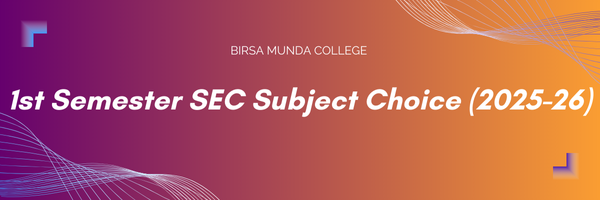Political Science
Our Departments
Announcements
About The Department
Why Study This Department?
1. Cultural Appreciation
Bengali literature offers a profound insight into the rich cultural heritage, traditions, and ethos of the Bengali-speaking people. By studying Bengali literature, students gain a deeper appreciation for the diverse cultural nuances embedded within the language, fostering cross-cultural understanding and respect.
2. Language Proficiency
Bengali literature serves as a linguistic resource for students to enhance their proficiency in the Bengali language. Through exposure to a wide array of literary genres, styles, and linguistic expressions, students develop a nuanced understanding of Bengali grammar, vocabulary, and syntax, thereby strengthening their language skills.
3. Aesthetic Appreciation
Exposure to the literary masterpieces of Bengali literature cultivates students' aesthetic sensibilities and fosters an appreciation for artistic expression. Through the exploration of poetic imagery, narrative techniques, and rhetorical devices, students develop a discerning eye for beauty, creativity, and artistic innovation.
4. Literary Analysis & Interpretation
Studying Bengali literature hones students' analytical and critical thinking abilities as they dissect and interpret complex literary texts. By analyzing themes, characters, motifs, and literary devices, students learn to discern deeper meanings, contextualize historical and social influences, and appreciate the intricacies of narrative structures.
5. Cultural & Historical Context
Bengali literature provides a window into the socio-political, historical, and cultural milieu of Bengal across different epochs. Through the study of literary works spanning various periods, students gain insights into the evolution of Bengali society, its triumphs, challenges, and transformations, thus fostering a holistic understanding of regional history and identity.
6. Identity Formation
Bengali literature plays a pivotal role in shaping individual and collective identities, offering diverse narratives and perspectives that resonate with readers' personal experiences and cultural backgrounds. By engaging with literary works that reflect themes of identity, belonging, and self-discovery, students embark on a journey of introspection and self-awareness, enriching their sense of cultural identity and belongingness.
Outcomes
- Siliguri Mahila Mahavidyalaya
- Siliguri Mahila Mahavidyalaya
- Siliguri Mahila Mahavidyalaya
- Siliguri Mahila Mahavidyalaya
- Siliguri Mahila Mahavidyalaya
Result (Last Five Years)
Study Material: Text Book, Class Notes, Online reading Materials (Articles and Links)
Number Departmental Library Book: 145 (Updated 2023)
| Sl. No. | Authority | Name | Designation | Email ID |
|---|---|---|---|---|
| 1 | First Appellate Authority | Dr. Birendra Mridha | Principal | birendramridha508@gmail.com |
| 2 | Second Appellate Authority | Ruma Dey | Assistant Professor | ruma.dey1@gmail.com |
| 3 | State Public Information Officer | Prem Kant Kamti | Assistant Professor | kamti.prem@gmail.com |
Faculty Members
Assistant Professor || Dept. of Pol. Science
Assistant Professor || Dept. of Pol. Science
Visiting Lecturer || Dept. of Pol. Science






